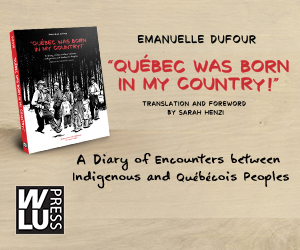The In Character Interview with Janet Kellough
In the wild, early days of Canada and the United States, saddlebag preachers (also known as circuit riders) were men of the cloth who travelled around ministering to settlers and founding early churches. In Janet Kellough's Thaddeus Lewis series, Lewis is just such a preacher, living the strange and unpredictable life of his unique profession. Lewis rides again in the latest addition to the series, Wishful Seeing (Dundurn). He starts off in a bad way, still mourning the death of his wife, but finally meets a woman who piques his interest. Only two small problems: she's married to someone else, and she's been accused of murder. Lewis sets out to solve the case with his 15-year old granddaughter, but their investigation uncovers much more than they expect.
We're talking with Janet today as part of our In Character series, learning all about Thaddeus Lewis and his adventures. Janet tells us about minor characters elbowing their way into main roles, how to avoid clunky dialogue, and her all time favourite fictional character.
Open Book:
Tell us about the main character in your new book.
Janet Kellough:
Thaddeus Lewis is a Methodist saddlebag preacher who is posted to a circuit in Northumberland County, Ontario. For the first time since his wife’s death, he meets a woman he’s interested in, but there’s a catch — not only is she already married, but she is accused of the murder that Thaddeus ultimately solves. Big, big moral dilemma for poor Thaddeus!
OB:
Some writers feel characters take on a “life of their own” during the writing process. Do you agree with this, or is a writer always in control?
JK:
I’m particularly susceptible to characters taking over because I don’t do extensive outlines before I start to write. Sometimes the characters that I initially think will be minor become really insistent that they have something to say. I let them. They take me places I would never have thought of on my own. And because the Thaddeus Lewis books are moving forward in time, characters who are relatively minor in previous books are starting to pop up as major characters in subsequent books. Morgan Spicer, whom we first meet in On the Head of a Pin returns in The Burying Ground. Thaddeus’s granddaughter Martha, who played a part in Sowing Poison is a major character in Wishful Seeing. And the sixth book, which is nearly finished, features the return of the major character Clementine Elliott from Sowing Poison. Clementine is incorrigible and has taken control of the story. Clementine is never minor. I’ve fallen in love with her.
OB:
How do you choose names for your characters?
JK:
The Thaddeus Lewis books are set in the 19th century when naming patterns were very different from today. I think a lot about names for major characters, but when christening minor characters (in a hurry because I don’t want to spend a lot of time on it) I go to a wonderful genealogical publication called Pioneer Life on the Bay of Quinte. I flip through the pages and pick a first name from one family tree and pair it with a second name from another. It’s quick and the names sound right for the era. With more modern settings, it’s useful to browse telephone directories from other cities and pick names from there.
OB:
What is your approach to crafting dialogue, particularly for your main character? Do you have any tips about writing dialogue for aspiring and emerging writers?
JK:
I’m also a storyteller so I need to hear dialogue spoken. Read it out loud. If it sounds clunky, it will read clunky.
Your CanLit News
Subscribe to Open Book’s newsletter to get local book events, literary content, writing tips, and more in your inbox
OB:
Do you have anything in common with your main character? What parts of yourself do you see in him or her, and what is particularly different?
JK:
Thaddeus Lewis is very loosely based on a real 19th century preacher, and because I’m basically a pagan, one of the most difficult things for me to come to terms with was his 19th century faith. Ultimately, I modernized him so that the fictional Thaddeus operates more from a strong set of personal ethics than from a strictly religious stance, although obviously his occupation plays a part in his decision-making. But he’ll struggle with questions of right and wrong, and that’s something that resonates very strongly with me. It also adds a depth to the character that makes him very appealing.
OB:
Who are some of the most memorable characters you’ve come across as a reader?
JK:
Hands-down all-time favourite is Anne of Green Gables. Anne insists that the world take her on her own terms. Recently, I really liked Nouschka Tremblay in Heather O’Neill’s The Girl Who Was Saturday Night. Both characters were dealt rough starts in life, but refused to let it defeat them.
OB:
What are you working on now?
JK:
I just finished an article for a UK publication about Canadian temperance pioneer Letitia Youmans. I’m also nearly finished another Thaddeus Lewis (see above). And in a complete departure, I wrote a futuristic thriller called The Bathwater Conspiracy, which is currently out for consideration, and I have a sequel rattling around in my head that I may start on soon. But I’ve also got a title that’s nagging at me — Me and D’Arcy McGee: “Busted flat in old Bytown, Waitin’ for a train…”
Janet Kellough is a professional storyteller who has written and appeared in numerous stage productions featuring a fusion of spoken word and music. Her previous books in the Thaddeus Lewis series are On the Head of a Pin, Sowing Poison, 47 Sorrows, and The Burying Ground. She lives in Prince Edward County, Ontario.


